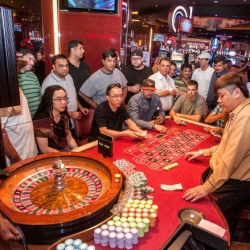Five Maryland lawmakers introduced General Assembly draft legislation, House Bill 1036, this week to criminalize cheating at the state’s six casinos. The MGM National Harbor backed HB 1036, which would give casinos deterrant power in fighting cheaters at live gaming tables in Maryland.
MGM National Harbor said it caught 172 cheaters in 2017, but its representatives estimate they only catch about 25% of cheaters. Statistics show that 63% of all cheating in the state takes place as MGM National Harbor, which generates the biggest revenues.
Currently, Maryland casinos who catch cheaters can toss the gambler out and place them on a blacklist. Besides pursuing general charges designed for thieves, no laws exist that allow casinos to pursue criminal charges against those cheats.
Since 2018, MGM Resorts, owner of MGM National Harbor, has backed legislation which would allow the company to go after casino cheats. An earlier version of HB 1036 was pushed in a April 2018 meeting of the Maryland House Ways and Means Committee.
The MGM representative told delegates, “We’re essentially just evicting them [casino cheats] and if they come back we can cite them for trespassing, but if they come back and don’t provide ID or bring someone else’s ID, we’re counting on my team to recognize all the people who we have caught cheating.”
House Bill 1036
The 2018 version of the bill only had one sponsor, though, and it gained no traction in the committee hearings. The 2019 version of HB 1036 appears to be much more substantial. Five Assembly delegates — including Jazz Lewis, Wanika Fisher, Michael Jackson, Andrea Fletcher Harrison, and Julian Ivey — introduced the current legislation into the Maryland General Assembly.
All five lawmakers are from Prince George County, where the MGM National Harbor is located. The bill appears to have widespread support from the casino industry, though.
Horseshoe Casino Baltimore, owned by MGM Resorts‘s rival Caesars Entertainment, gave its support to the bill. A representative for Horseshoe Baltimore said, “Clear statutory criminal guidelines with regard to cheating in casinos is good public policy.”
The Caesars employee added that HB 1036 “might actually lead to deterrents.”
What Would Be Punished as Cheating?
Six different forms of cheating would be criminalized: bet capping, past posting, bet pinching, bet switching, card marking, and dice sliding. Punishment for cheating at Maryland casinos would be severe. For someone who cheats to win $100 or less, a cheater could spend up to 3 months in jail. The cheater also would be required to pay a nominal fine, but the jail time would be the main deterrent.
Cheaters who won between $1,500 and $25,000 could be sent to prison up to 5 years. A maximum fine of $10,000 also would be assessed, though cheats in any case would be required to pay back the casino the amount of the money they collected from cheating.
MGM National Harbor’s Argument
Kerry R. Watson, MGM National Harbor’s VP of Governmental Affairs, was at the 2018 hearing to give his casino’s perspective. Mr. Watson told delegates, “We’re not trying to create new penalties, we’re trying to associate these penalties directly with what currently exists. If it’s a $500 theft off the casino floor, it would match what is on the criminal statute [for a $500 theft] currently.”
“We’re not trying to put people in jail. This is really just a discouragement of this kind of behavior continuing to happen in the casinos throughout the state. You don’t want Maryland to be the target, the place that’s a little weaker and where people come to target our casinos specifically.”
Skeptics among Maryland Lawmakers
Not everyone is on board with the legislation. Several Maryland lawmakers said the 2018 version of the bill did not define the crimes well enough. The 2019 version of HB 1036 tightens the language significantly.
Despite that, lawmakers still express some skepticism of certain language. One clause makes it illegal for gamblers to use slots credits left by previous bettors, which certain lawmakers believe could lead to unfortunate prosecutions involving innocent mistakes. MGM Resorts’ representatives said the bill is designed to target those who walk slots row looking for abandoned credits — not those who sit down by mistake at someone else’s slots session.
Another lawmaker was concerned that the law could target problem gamblers. Maryland has some of the most progressive laws for problem gamblers, so a bill which targets desperate gamblers could meet significant opposition in the legislature.

